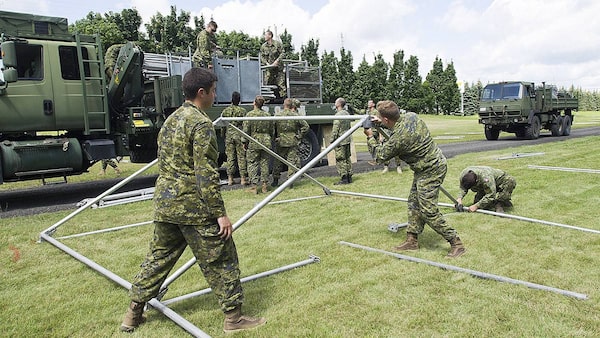
Members of the Canadian armed forces erect tents to house asylum seekers at the Canada-United States border in Lacolle, Que. Wednesday, August 9, 2017.Graham Hughes/The Canadian Press
Canadian soldiers have built a small tent village in Quebec to relieve pressure on a Border Services outpost jammed with asylum seekers who got into the country from the United States.
About 100 Canadian Armed Forces personnel put finishing touches on the camp Wednesday evening, installing generators, lights, heating and wooden floors in 25 large tents that can house about 500 people altogether. The tents are only for brief stays while asylum seekers wait for initial processing.
But they present a fresh symbol of how a recent wave of border-crossers have taxed the Canadian border and immigration systems in Quebec.
Last month, the border crossing at Saint-Bernard-de-Lacolle, about 60 kilometres south of Montreal, was running near capacity as it processed up to 150 asylum seekers every day. That number is now reaching between 400 to 600 on many days, according to Jean-Pierre Fortin, national president of the Customs and Immigration Union, meaning a backlog is building as many arrivals once processed in a few hours now must now wait a few days.
Explainer: What you need to know about the Quebec asylum seekers
Opinion: There's no easy solution to Canada's border problem
The federal government has said all necessary resources are being sent to Quebec to meet the demand. The Canada Border Services Agency did not respond to specific questions about resources on Wednesday. Mr. Fortin said 15 to 20 border agents have been brought in from across the country to bolster the Lacolle roster of about 90 agents who operate the post 24 hours a day, seven days a week.
Agents are also working all the overtime they can handle, Mr. Fortin said, but there are other logistical hurdles to processing more people.
"It's not just a matter of human resources; we don't have enough computers," he said. "The building in Lacolle was not built to handle 500 people."
Mr. Fortin, who is in regular contact with agents and visited this week, said the Lacolle office ordered 900 breakfasts Tuesday from a catering company to feed people waiting at the post and others coming in from the Roxham Road informal crossing where most of the asylum seekers have walked into Canada.
Military officials stressed they were asked to build the tent village by civilian authorities and that they would play no role in security or law enforcement tasks. "Once the task is completed, we believe on Thursday, the majority of our personnel will go back to base," military spokesman Major Yves Desbiens said. "A few individuals will stay behind to maintain our equipment. We won't be doing security rounds or logistical support."
The federal government brought in the army after a request from the province.
Once the border crossers are processed at Lacolle, they will leave the tent village and take a chartered bus to Montreal. Officials there said Wednesday they are housing 2,620 people at the usual YMCA dormitory and several temporary sites including Olympic Stadium. The officials announced a mothballed hospital, the Royal Victoria, will be used to house hundreds more asylum claimants.
Francine Dupuis of Montreal's refugee settlement agency said 1,650 asylum seekers were received in July, nearly 10 times the number one year earlier. "The situation is under control, but obviously it's highly unusual," Ms. Dupuis said. "But it's not the first big spike of this kind we've seen."
Quebec saw an increase in asylum claimants travelling from the United States in the winter with the election of U.S. President Donald Trump, who promised a crackdown on immigration and tried to ban travel from some Muslim-majority countries. In May, his administration said special status that allowed 58,000 Haitians to stay in the country would end in January, triggering the latest surge.
Mr. Fortin said his union suggested to Ottawa that the entire asylum processing operation should be moved to a military base in Saint-Jean-sur-Richelieu, where sufficient housing and infrastructure is in place and "computers could presumably be plugged in." He said the federal government has not answered.
 Les Perreaux
Les Perreaux